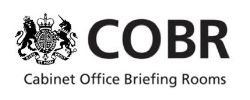Top Qs
Timeline
Chat
Perspective
Cabinet Office Briefing Rooms
UK government facility for crisis meetings From Wikipedia, the free encyclopedia
Remove ads
The Cabinet Office Briefing Rooms (COBR) are meeting rooms in the Cabinet Office in London. These rooms are used for committees which co-ordinate the actions of government bodies in response to national or regional crises, or during overseas events with major implications for the UK. It is sometimes referred to as COBRA by media sources.
Remove ads
The facility
The Cabinet Office Briefing Rooms are a group of meeting rooms in the Cabinet Office at 70 Whitehall in London, often used for different committees which co-ordinate the actions of bodies within the Government of the United Kingdom in response to instances of national or regional crisis, or during events abroad with major implications for the UK. It is often referred to as COBRA, although this is not an official term.[1][2] The reason for the different titles is unclear; it may have been confused with other meeting rooms in the Cabinet Office which are not part of the COBR facility.[3]

A single photo of one of the rooms in COBR was released in 2010 in response to a Freedom of Information Act request.[4]
Remove ads
The committees
The composition of a ministerial-level meeting in COBR depends on the nature of the incident but it is usually chaired by the Prime Minister or another senior minister, with other key ministers as appropriate, city mayors and representatives of relevant external organisations such as the National Police Chiefs' Council and the Local Government Association.[5]
The Scientific Advisory Group for Emergencies (SAGE) is a sub-committee of COBR.[6]
Remove ads
The events
The first COBR meeting took place in the 1970s to oversee the government's response to the 1972 miners' strike.[7][8] Other events that have led to meetings being convened include the 1980 Iranian Embassy siege, the 11 September 2001 attacks, the July 2015 presence of migrants in and around Calais,[9] the COVID-19 pandemic,[10] and the 2024 England riots.[11]
Criticisms
In 2009, former senior police officer Andy Hayman, who sat on a committee after the 7 July 2005 London bombings and at other intervals from 2005 to 2007, was highly critical of its "cumbersome, bureaucratic and overly political" workings in his book The Terrorist Hunters.[12]
See also
- National Security Council
- Civil Contingencies Secretariat
- COBRA (British TV series)
- Scottish Government Resilience Room, the emergency management centre used by the Scottish Government in Scotland to co–ordinate response in Scotland
References
Wikiwand - on
Seamless Wikipedia browsing. On steroids.
Remove ads

